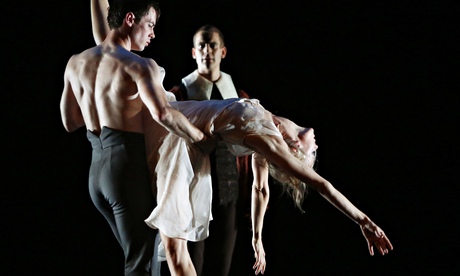
Choreographer Christopher Bruce found a CD of Richard Burton reading Dylan Thomas in his local music shop. And here it is now, booming off the theatre walls to accompany Ten Poems, a lovingly crafted response, created by Bruce in 2009 for the German company Ballet Kiel and revived for this UK premiere as part of Scottish Ballet’s current tour.
Thomas’s wordscape, rich with nightjars and dipping moons, spinning places and seesaw Sunday nights is interpreted in gentle, rolling narratives played out by small groups of dancers. Three pigtailed girls drop hankies for the boys, the hunchback rolls in secret communion with the straight woman, and the roué’s death is clasped by three aproned graces.
Laced with storytelling mime, Bruce’s choreography allows the dancers to lean into the poet’s rhythmic patterning. But it is the performance from the dead that drives this compelling 20 minutes, with Burton and Thomas striding over the hills together as the dancers softly echo their giant steps in the valley below.
The programme continues with a new commission from Brooklyn-based Helen Pickett. Continuing the theme of literary exploration, she lights on The Crucible, by another heavyweight, Arthur Miller. The curtain opens on a spare scene – pulpit and seated Puritan congregation; the story of the Salem witch trials of 1692 unfolds in a neatly dispensed distillation.
Pickett is brave with her 40-minute edit, bringing the girls’ “demonic” dance in the forest to the fore (Jon Hopkins’ electronica sets the beat), and moving events swiftly along in multi-scene compositions set against expansive string- and drum-filled cinematic scores.
But, as in Ten Poems, such monumental material inevitably puts pressure on the adaptation. Savvy and sophisticated, with a dramatic style rooted in Pickett’s years working with choreographer William Forsythe, it nevertheless skims this parable of mass hysteria too superficially to reach the heart and horror of the ensuing witch-hunt and murder by trial.

